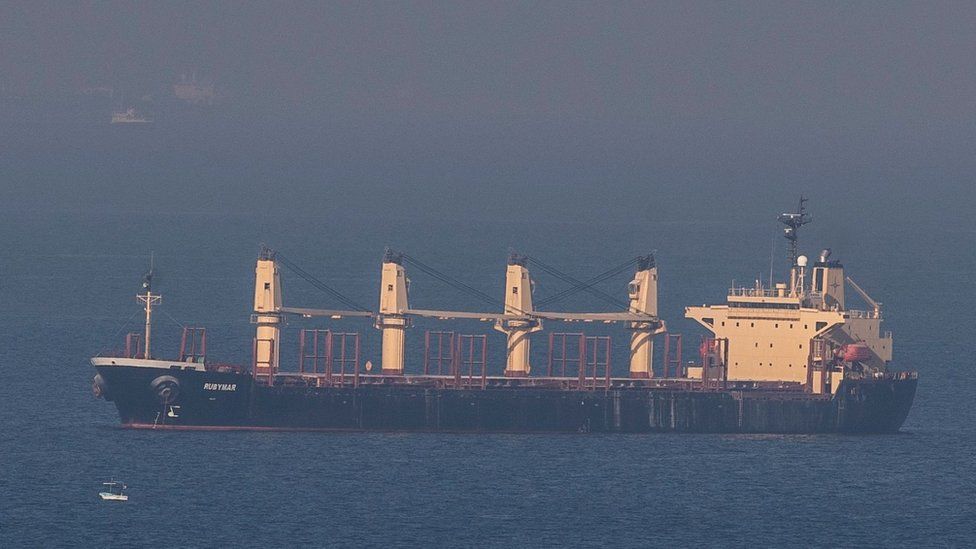Crew abandon UK-registered cargo ship after Houthi attack off Yemen
- Published

The crew of a Belize-flagged, British-registered cargo vessel have abandoned ship off Yemen after it was hit by missiles fired by the Houthi movement.
The Rubymar was in the Gulf of Aden near the Bab al-Mandab Strait when it was hit and the crew abandoned ship.
On Monday the Houthis claimed the vessel had sunk.
But on Tuesday, maritime security firm Ambrey and the UK Royal Navy told BBC Verify they have not seen any evidence of this.
The strikes on the Rubymar are among the most damaging attacks so far by the Iran-backed Houthis.
They have launched dozens of missiles and drones at merchant vessels and Western warships since mid-November.
The Houthis say their attacks are a show of support for the Palestinians in the war between Israel and Hamas in the Gaza Strip.
On Monday a Houthi spokesman claimed the vessel suffered "catastrophic damage" and had sunk - a claim which has now been refuted.
The UK government said the Rubymar was taking on water, had been abandoned and the crew taken to safety.
It condemned the attacks as "completely unacceptable" and said the UK and its allies reserved the right to respond appropriately.
The Houthi movement's spokesman also claimed its forces had attacked two US-owned cargo vessels, the Sea Champion and the Navis Fortuna, in the Gulf of Aden.
He added that Houthi air defences in the Red Sea province of Hudaydah had shot down a US MQ-9 Reaper unmanned aerial vehicle (UAV) "while it was carrying out hostile missions against our country on behalf of [Israel]".
There was no immediate comment from the US military.
The Houthis' attacks have prompted many shipping companies to stop using the critical waterway, which accounts for about 12% of global seaborne trade.
US and British forces began carrying out air strikes on military targets across Houthi-controlled western Yemen in response last month.
On Sunday night, the UK Maritime Trade Operations (UKMTO) agency said it had received a report of an incident from an unnamed ship about 35 nautical miles (65km) south of the Yemeni Red Sea port of Mocha.
The master had reported "an explosion in close proximity to the vessel resulting in damage" at about 23:00 local time (20:00 GMT), it added.
Early on Monday, the agency cited military authorities as reporting that the crew abandoned the vessel, which was carrying "very dangerous" fertiliser, following an attack.
"Vessel at anchor and all crew are safe," it said. "Military authorities remain on scene to provide assistance."
British maritime security firm Ambrey separately reported that a Belize-flagged cargo ship had come under attack in the Bab al-Mandab Strait on Sunday as it sailed northwards.
Frank Gardner and expert guests look at the crisis in the Red Sea after attacks on ships by the Yemeni Houthi group.
Rubymar's security firm, LSS Sapu, and data provider Lloyd's List Intelligence later confirmed that it had sustained damage after being hit by two missiles.
According to data from MarineTraffic, which last received a tracking signal on Sunday, the Rubymar had been travelling from Saudi Arabia to Bulgaria.
The Djibouti Port Authority said it had co-ordinated the safe repatriation of the Rubymar's 24 crew members - 11 Syrians, six Egyptians, four Filipinos and three Indians - after they were initially assisted by a passing vessel.
The 172m-long Rubymar is flagged in Belize, its operators are from Lebanon and its registered owner is Golden Adventure Shipping, with an address in the British port of Southampton.
US Central Command said its forces had carried out five strikes against three mobile anti-ship cruise missiles, one unmanned underwater vessel (UUV) and one unmanned surface vessel (USV) in Houthi-controlled areas of Yemen on Saturday after determining that they presented an imminent threat to US Navy ships and merchant vessels in the region.
It was the first time that US forces had identified a UUV, or submarine drone, being employed by the Houthis since the attacks began.
BBC security correspondent Frank Gardner says the discovery that the Houthis are deploying both USVs and UUVs is a worrying development. The concept of a "swarm attack" - launching a number of relatively cheap missiles and drones simultaneously at an enemy in the hopes of confusing and overwhelming their defences - is straight out of the playbook of the navy of Iran's Revolutionary Guards.
In a further update on Tuesday, US Central Command said it had launched more strikes against Houthi targets after US forces intercepted 15 missiles and drones over a 24 period.
As Houthi attacks on shipping in the lower Red Sea and adjacent Gulf of Aden show no sign of stopping, the prospect of such an attack being directed at a US or British warship is an ever-present threat for those crews now serving there, our correspondent adds.
In another development, EU foreign ministers meeting in Brussels approved a mission to help protect international shipping in the Red Sea. It aims to have the operation which will involve four ships from France, Germany, Italy and Belgium up and running in a few weeks.
Related Topics
- Published6 February
- Published7 February
- Published3 February